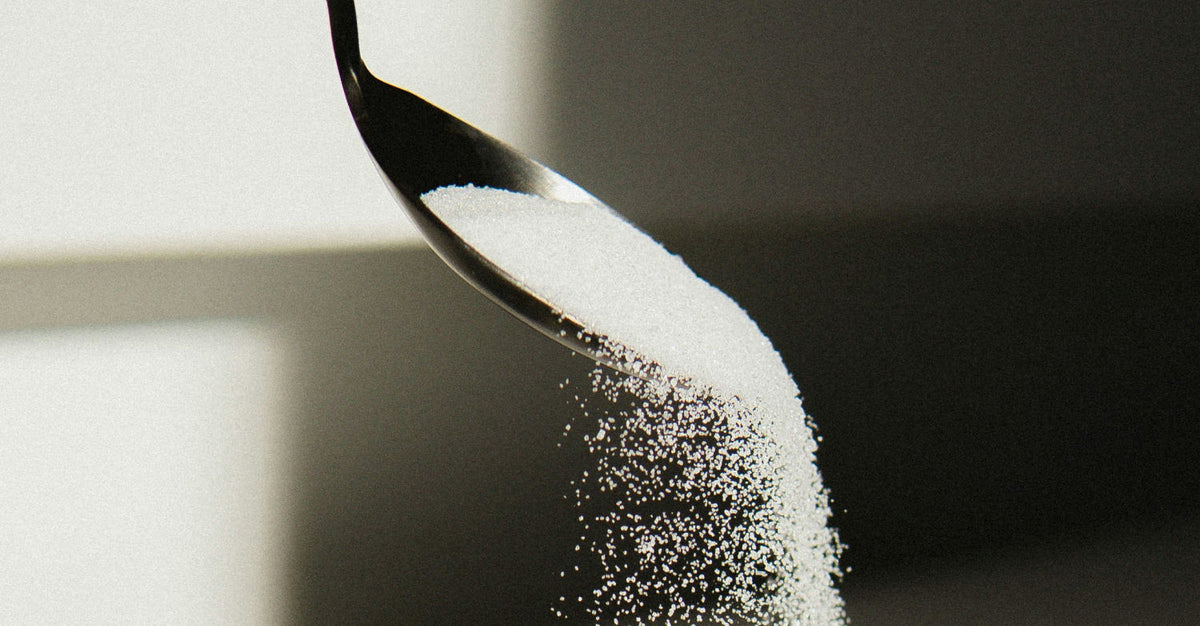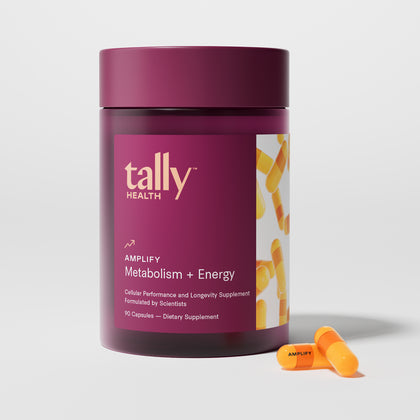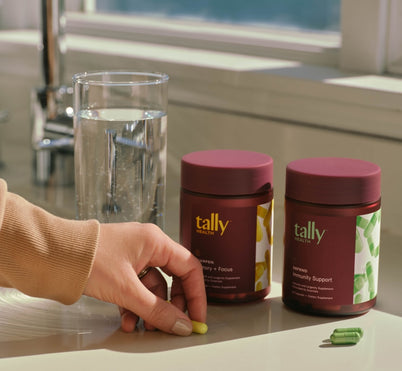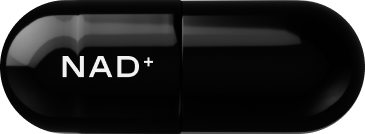

When it comes to flavored foods and beverages, it can feel like you’re choosing between two extremes: real sugar or artificial sweeteners. Both make things taste sweet, but their health effects are far from identical.
At Tally Health, we know that what you eat every day plays a major role in how well you age — at both the cellular and behavioral level. Diet choices like how you sweeten your coffee or what you drink with lunch can influence your metabolic health, biological age, and long-term longevity outcomes.
So — which option is actually better for you? Let’s break down what science says.
What Counts as “Sugar”?

“Sugar” usually refers to natural sugars like glucose, fructose, and sucrose — the main table sugar you add to your coffee or find in fruit juice, honey, maple syrup, and processed foods.
These sugars are nutritive sweeteners, meaning they contain calories and can raise blood sugar levels after eating.
When consumed in excess, sugar sweetened beverages and other sugary foods can contribute to:
Weight gain and excess calorie intake
Tooth decay
Increased risk of metabolic syndrome, high blood pressure, and heart disease
Greater risk of developing type 2 diabetes
The World Health Organization (WHO) and American Diabetes Association (ADA) both recommend limiting added sugars to support healthy body weight and blood glucose control.
What Are Artificial Sweeteners?

Artificial sweeteners — also called non-nutritive sweeteners, sugar substitutes, or high-intensity sweeteners — provide a sweet taste with few or no calories.
They can be hundreds of times sweeter than sugar, which means only tiny amounts are needed to sweeten foods.
Examples of FDA-approved sweeteners include:
Sucralose (often labeled Splenda®, an FDA-approved sucralose)
Acesulfame potassium (Ace-K)
Aspartame
Saccharin
Neotame
Advantame
And newer natural sugar substitutes like stevia and monk fruit extract are also considered nonnutritive sweeteners.
These are found in diet sodas, sugar-free candies, chewing gum, frozen dairy desserts, breakfast cereals, and countless artificially sweetened foods.
What Does the Research Say About Health Effects of Sugar Substitutes?

1. Calories & Weight
Because artificial sweeteners contain fewer calories than sugar, they’ve been promoted for weight loss and to help consume fewer calories overall.
Some studies suggest that replacing sugar-sweetened beverages with artificially sweetened ones may reduce total energy intake and help manage body weight.
But results are mixed — certain animal and human studies show that frequent artificial sweetener consumption can increase cravings and may actually lead to higher food intake later.
2. Metabolic & Blood Sugar Effects
Unlike table sugar, most non-nutritive sweeteners don’t directly raise blood sugar or blood glucose levels. That’s good news for people monitoring diabetes risk.
However, more research is needed on how long-term use might affect insulin sensitivity, gut microbiome, and metabolism.
Some animal studies have suggested that certain artificially sweetened beverages could alter the gut microbiota, potentially influencing glucose control — but further research is needed in humans.
3. Safety & Cancer Risk
All sweeteners approved by the Food and Drug Administration (FDA) have an acceptable daily intake (ADI), representing the amount considered safe for human consumption.
While early research raised concerns about bladder cancer in animals exposed to very high doses of saccharin, these findings have not been replicated in humans. The FDA and World Health Organization currently consider approved food additives to pose no appreciable health risk when consumed within recommended limits.
The Bigger Picture: Artificial vs. Real

The Longevity Lens: What’s the healthiest approach?

At Tally Health, we focus on how daily choices — from diet to sleep to mindset — shape your biological age.
While replacing sugar with artificially sweetened soft drinks might help you consume fewer calories, it’s not a free pass. Your body still responds to sweet taste cues, which can influence hunger and mood over time.
The healthiest approach?
Minimize added sugars and artificially sweetened foods alike.
Choose naturally sweet options like fruit or monk fruit extract when possible.
Drink more water or unsweetened tea instead of soft drinks (sugar-sweetened or artificially sweetened).
Bottom Line

Both natural sugars and artificial sweeteners can fit into a balanced diet — but moderation is key.
Real sugar is natural but calorie-dense and raises blood sugar levels.
Artificial sweeteners are calorie-free but still under study for long-term health effects.
For most people, limiting both added sugars and artificially sweetened beverages supports better metabolic health, body weight, and longevity.
Because in the end, what matters most isn’t how you sweeten your life — it’s how long and well you live it.
References
- Suez et al. Personalized microbiome-driven effects of non-nutritive sweeteners on human glucose tolerance. Cell 2022; https://doi.org/10.1016/j.cell.2022.07.016
- Kossiva et al.Chronic Use of Artificial Sweeteners: Pros and Cons. Nutrients 2024; https://doi.org/10.3390/nu16183162
- Queiroz et al. High consumption of artificially sweetened beverages and associated risk of cardiovascular events: A systematic review and meta-analysis. Curr Probl Cardiol 2025; https://doi.org/10.1016/j.cpcardiol.2024.102837
- Debras et al. Artificial sweeteners and cancer risk: Results from the NutriNet-Santé population-based cohort study. PLoS Med 2022; https://doi.org/10.1371/journal.pmed.1003950
- Muñoz-Labrador et al. A review of the state of sweeteners science: the natural versus artificial non-caloric sweeteners debate. Stevia rebaudiana and Siraitia grosvenorii into the spotlight. Crit Rev Biotechnol 2024; https://doi.org/10.1080/07388551.2023.2254929
What counts as “sugar”?
“Sugar” usually refers to natural sugars like glucose, fructose, and sucrose — the main table sugar you add to your coffee or find in fruit juice, honey, maple syrup, and processed foods. These sugars are nutritive sweeteners, meaning they contain calories and can raise blood sugar levels after eating.
What are artificial sweeteners?
Artificial sweeteners — also called non-nutritive sweeteners, sugar substitutes, or high-intensity sweeteners — provide a sweet taste with few or no calories. They can be hundreds of times sweeter than sugar, which means only tiny amounts are needed to sweeten foods. Examples of FDA-approved sweeteners include sucralose, acesulfame potassium, aspartame, saccharin, neotame, and
What does the research say about the health effects of sugar substitutes?
Because artificial sweeteners contain fewer calories than sugar, they’ve been promoted for weight loss and to help consume fewer calories overall. Some studies suggest they may reduce total energy intake and help manage body weight, but results are mixed — certain studies show they can increase cravings and food intake later. While they usually don’t raise blood sugar, more research is needed on their long-term effects on metabolism, gut microbiome, and insulin sensitivity.











